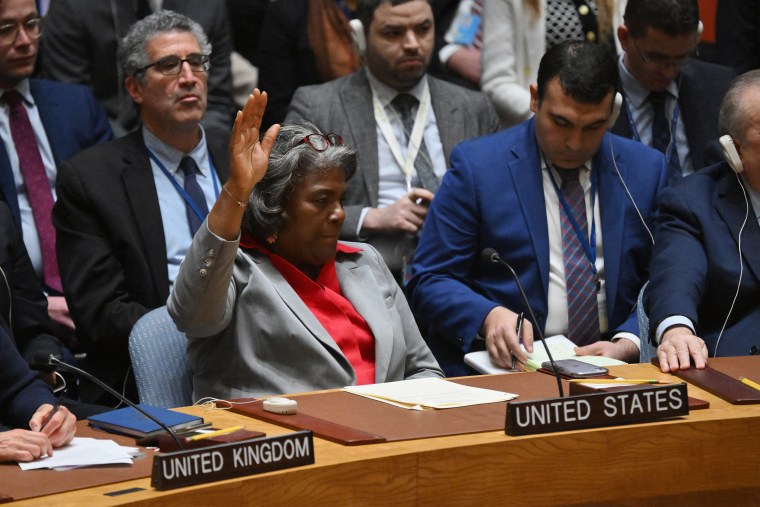TEL AVIV — As tensions rise between the two countries, U.S. Defense Secretary Lloyd Austin met with his Israeli counterpart, Yoav Gallant, on Tuesday, a day after the United States abstained in a United Nations Security Council vote calling for an immediate cease-fire in Gaza.
After the historic abstention by one of its closest allies, Israel abruptly canceled the visit of a high-level delegation to Washington this week. But Gallant, who arrived in the U.S. on Monday, stayed on in the capital and met with Secretary of State Antony Blinken and national security adviser Jake Sullivan.
The Defense Department’s press secretary, Maj. Gen. Pat Ryder, said Tuesday’s meeting was a “testament to the United States’ unwavering support for Israel’s long-term security” as the two counterparts “affirmed their shared interests in defeating Hamas.”
But also at the top of the agenda was Israel’s plans to launch an offensive in Gaza’s southernmost city, Rafah, where more than 1 million people displaced from elsewhere in the strip have sought shelter.
“Secretary Austin and Minister Gallant discussed the importance of prioritizing civilian protection in the event of military operations in Rafah, the dire humanitarian situation across Gaza, and threats to regional security,” Ryder said in a statement.
He said Austin stressed that both the U.S. and Israel have a “moral imperative and a shared strategic interest in safeguarding civilians, noting that operations in Rafah should not proceed without a credible and implementable plan that ensures the safety of and humanitarian support for civilians sheltering there.”
Gallant shared a photo on X after the meeting, saying the two discussed “progress of the fight to defeat Hamas, and we talked about the efforts to return the abductees which require the combined hands of Israel and the USA.”
He made no mention of discussion around Israel’s plans for a ground offensive into Rafah.
Struggling to keep afloat his governing coalition, the most right-wing government in the country’s history, and with members of the Cabinet pushing for an even more aggressive approach in Gaza, Israeli Prime Minister Benjamin Netanyahu has repeatedly stated his determination to launch a military operation in the city in spite of repeated American warnings against it. He has said that Hamas cannot be defeated unless Israel takes out four battalions, made up of thousands of fighters, which he says are sheltering there.
President Joe Biden, meanwhile, is facing growing political pressure of his own at home and abroad to do more to help lessen Palestinian suffering and deaths, even as the U.S. continues to supply Israel with military hardware.

Israel’s offensive has killed more than 32,000 people in the Gaza Strip, according to its Health Ministry, and driven a third of the enclave’s population to the brink of starvation. It was launched in response to Hamas’ Oct. 7 attack on Israel, which killed some 1,200 people and saw 240 taken hostage.
Ryder’s comments came after the U.S. abstention at the Security Council, which elicited a furious response from Netanyahu’s office in a series of posts on X.
Calling it a “clear departure from the consistent U.S. position in the Security Council since the beginning of the war,” Netanyahu’s office said that it would give Hamas “hope that international pressure will force Israel to accept a cease-fire without the release of our hostages, thus harming both the war effort and the effort to release the hostages.”
Having previously vetoed three cease-fire resolutions at the Security Council and seen a fourth fail to pass Friday when Russia and China refused to back a U.S.-led motion, U.S. Ambassador Linda Thomas-Greenfield decided not to use America’s veto power at Monday’s vote, which passed 14-0.
Thomas-Greenfield said Washington did not “agree with everything” in the resolution, which demanded an immediate cease-fire through Ramadan, which ends April 9, as well as the immediate release of hostages held in Gaza and an expansion of the flow of aid into the enclave. She added that “a cease-fire could have come about months ago if Hamas had been willing to release hostages.”
Gilad Erdan, Israel’s ambassador to the U.N., called it a “shameful resolution” and said it undermined efforts to secure the release of the remaining 134 hostages, although officials in the country say 33 have died in captivity.

Riyad Mansour, the Palestinian observer to the U.N., welcomed the adoption of the resolution as a “vote for humanity and life to prevail,” but he noted that it had taken almost six months of war for the Security Council to “finally demand an immediate cease-fire.”
However, Avi Melamed, a former Israeli intelligence official and negotiator, told NBC News that he thought his government was unlikely to change course because of the vote.
“Israel will not end this war before the hostages are going back home, whatever the price is going to be,” he said in a phone interview Tuesday. “I think this is something the international community must internalize.”
Melamed said Netanyahu recognizes that “Israeli public opinion will not accept anything less than bringing back the hostages.” Even as public support for his leadership has dwindled, Melamed added, the Israeli leader appeared determined to lead his country to an “ultimate victory at all costs, including the cost of a collision with the United States.”
In a poll released conducted earlier this month and released Tuesday by the Jerusalem-based Israel Democracy Institute, 57% of participants in Israel rated Netanyahu’s performance since Oct. 7 as “poor or very poor,” compared with 28% who deemed his performance “good or excellent” and 14% who said it was “so-so.”
The U.S. was “very disappointed” by the Israeli Prime Minister’s decision to cancel the visit of the high-level delegation to Washington, national security spokesman John Kirby said Monday, adding that the U.S. had hoped to have a “fulsome conversation with them about viable alternatives to going in on the ground in Rafah.”











